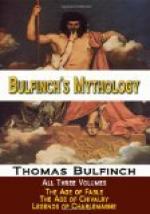“Most rich and fair
of color,
Like gold it glittering
shone,
And much the knights in Arthur’s
court
Admired her every
one.”
[Footnote 1: New-fangled—fond of novelty.]
The ballad goes on to tell of two more trials of a similar kind, made by means of a boar’s head and a drinking horn, in both of which the result was equally favorable with the first to Sir Cradock and his lady. It then concludes as follows:
“Thus boar’s head,
horn, and mantle
Were this fair
couple’s meed;
And all such constant lovers,
God send them
well to speed”
—Percy’s Reliques.
CHAPTER VIII
LAUNCELOT OF THE LAKE
King Ban, of Brittany, the faithful ally of Arthur was attacked by his enemy Claudas, and after a long war saw himself reduced to the possession of a single fortress, where he was besieged by his enemy. In this extremity he determined to solicit the assistance of Arthur, and escaped in a dark night, with his wife Helen and his infant son Launcelot, leaving his castle in the hands of his seneschal, who immediately surrendered the place to Claudas. The flames of his burning citadel reached the eyes of the unfortunate monarch during his flight and he expired with grief. The wretched Helen, leaving her child on the brink of a lake, flew to receive the last sighs of her husband, and on returning perceived the little Launcelot in the arms of a nymph, who, on the approach of the queen, threw herself into the lake with the child. This nymph was Viviane, mistress of the enchanter Merlin, better known by the name of the Lady of the Lake. Launcelot received his appellation from having been educated at the court of this enchantress, whose palace was situated in the midst, not of a real, but, like the appearance which deceives the African traveller, of an imaginary lake, whose deluding resemblance served as a barrier to her residence. Here she dwelt not alone, but in the midst of a numerous retinue, and a splendid court of knights and damsels.
The queen, after her double loss, retired to a convent, where she was joined by the widow of Bohort, for this good king had died of grief on hearing of the death of his brother Ban. His two sons, Lionel and Bohort, were rescued by a faithful knight, and arrived in the shape of greyhounds at the palace of the lake, where, having resumed their natural form, they were educated along with their cousin Launcelot.
The fairy, when her pupil had attained the age of eighteen, conveyed him to the court of Arthur for the purpose of demanding his admission to the honor of knighthood; and at the first appearance of the youthful candidate the graces of his person, which were not inferior to his courage and skill in arms, made an instantaneous and indelible impression on the heart of Guenever, while her charms inspired him




